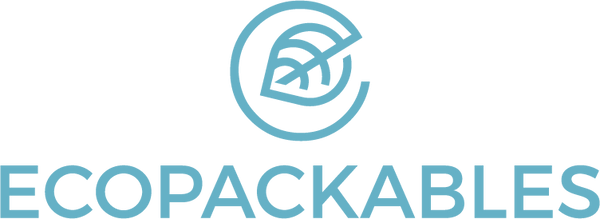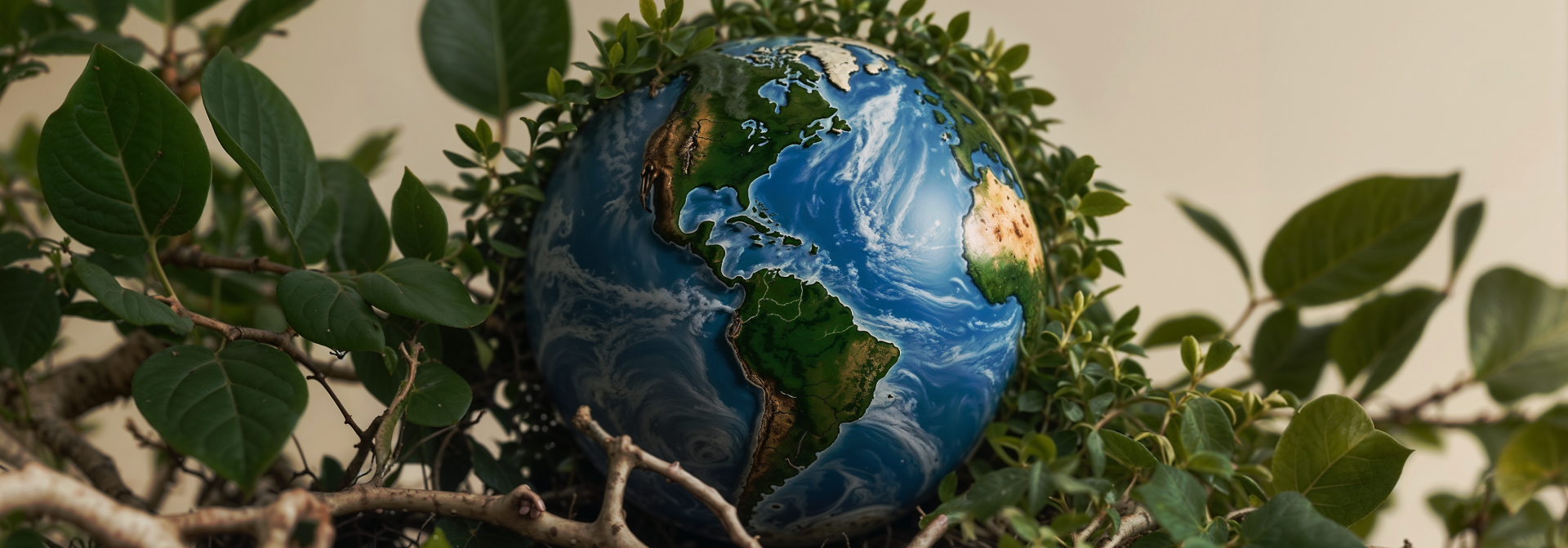

Our Materials
At EcoPackables, we keep things simple. We only use materials that are recycled or recyclable (often both!) or certified compostable.
It’s important to note that there’s no such thing as perfect, 100% sustainable packaging yet. Every material has its own pros and cons, which we’ve carefully evaluated. We’re always transparent about the benefits and challenges of specific packaging choices and seek to help brands make educated, effective decisions.
This list of materials is constantly changing as we encounter innovative materials and technologies. You can rest assured that the materials we use are the most sustainable options available on the market.
All of the films and boards below are heavily customizable and available as finished packaging products, or as films that can run on existing film-converting machinery.
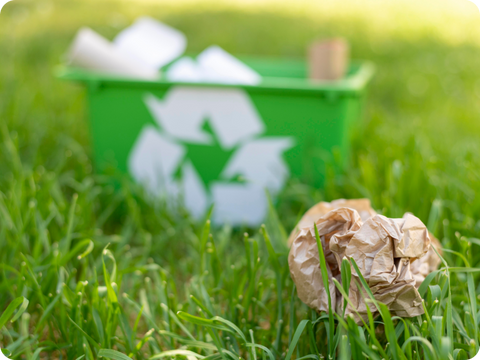

Why We Only Use Sustainable Materials
A key part of our sustainable packaging framework is Sustainable Materials Only.
This is important to us because we see sustainability as more than just a business strategy or compliance requirement. Sustainability is our “why.” And we’re passionate about helping other brands who share our values.
We’re here to make sustainable packaging decisions easier and more accessible. When you work with us, you can trust that all our materials are fully vetted, backed by trusted certifications, and chosen with the planet in mind.
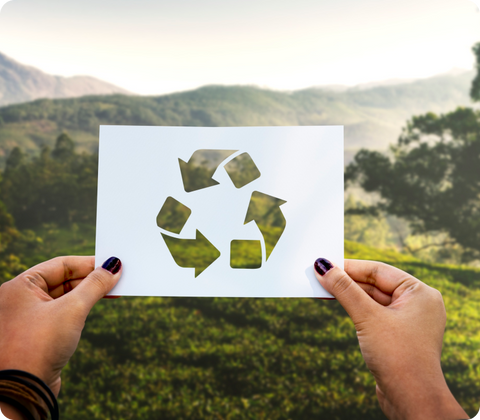



How We Tailor Materials to Your Brand's Needs
No two brands are alike — so every brand's packaging needs are different, too.
This is why we take the time to assess every factor both thoroughly and holistically for each brand we work with.
What's feasible in one situation isn't in another — and, for that matter, what's sustainable in one application is not ideal in others.
One of our top priorities is helping brands identify a sustainable packaging strategy that is effective, impactful, and makes sense for their business.
We look at key requirements including:
- Impact goals (such as plastic-free or carbon reduction)
- Product lines
- Operational needs
- Functional needs (such as moisture barriers)
- Budgeting targets
- Aesthetic preferences
We work hard to offer you a clear, unbiased evaluation of our materials and help you choose the packaging that will meet your brand's needs. And if your brand is still building momentum toward your long-term sustainability vision, we can help you design a path to get there.
Explore our sustainable packaging materials below, or reach out to us directly for individual guidance on choosing the right materials for your brand.




Our Packaging Materials
|
Material
|
Recycled Content
|
Recyclable
|
Home Compostable
|
Industrial Compostable
|
Certification
|
|---|---|---|---|---|---|
| D42 Film | TUV, BPI | ||||
| D41 Film | TUV, BPI | ||||
| D42 Bubble | TUV, BPI | ||||
| D39 Film | #4 | GRS | |||
| D38 Film | #4 | GRS | |||
| D39 Bubble | #4 | GRS | |||
| Kraft Paper | Curbside | Yes* | FSC | ||
| White Kraft | Curbside | Yes* | FSC | ||
| Kraft Corrugate | Curbside | Yes* | FSC | ||
| Ocea™ Garment Film | Partial | Curbside | Yes* | FSC |


Recycled LDPE Films
Our recycled LDPE films are GRS 4.0 certified for recycled content. They’re made from either pre-consumer or post-industrial waste, or a blend of both. Our films are compatible with thin-film recycling.
Our recycled poly film is highly versatile and supports beautiful custom branding. It uses less water and energy to produce than virgin plastic, and helps reduce reliance on additional fossil fuels. Since recycled plastic is lightweight, it also has a lower transportation footprint than heavier packaging types.
In many cases, recycled plastic film can be even more cost effective than virgin plastic packaging!
We stock several vetted LDPE films for different applications.

EcoPackables D39 Film
GRS 4.0 Certified Recycled Plastic Film that can be made from 100% PCR content, or a blend of post-consumer and post-industrial waste. We can tailor this highly customizable film according to your product specifications and printing needs.
Thickness: 30-110μm
Certifications: GRS (Global Recycled Standard) 4.0 Certified Recycled Content
Common Uses: Mailers, inner packaging
End of Life: Thin film recyclable through drop-off or collection programs

EcoPackables D38 Film
GRS 4.0 Certified Recycled Fully Transparent Film that is made from 100% Post-Industrial Waste. This single-layer film is ideal for applications where transparency is required, such as garment packaging.
Thickness: 30-110μm
Certifications: GRS (Global Recycled Standard) 4.0 Certified Recycled Content
Common Uses: Poly bags, garment bags, applications that require transparency
End of Life: Thin film recyclable through drop-off or collection programs
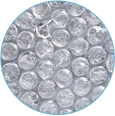
EcoPackables D39 Bubble
GRS 4.0 Certified Recycled Bubble Film that can be made from 100% PCR content, or a blend of post-consumer and post-industrial waste. The color can be customized. This film can also be combined with other materials to add cushioning to your packaging.
Thickness: Height and thickness can be fully customized
Certifications: GRS (Global Recycled Standard) 4.0 Certified Recycled Content
Common Uses: Bubble mailers, protective packaging, cushioning layers
End of Life: Thin film recyclable through drop-off or collection programs
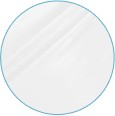
Renewa™ Film
GRS 4.0 Certified Recycled Translucent Plastic Film that is made from oceanbound plastic collected from waterways in coastal cities. We can tailor this highly customizable film to meet your product specifications and design requirements.
Thickness: 30-110μm
Certifications: GRS (Global Recycled Standard) 4.0 Certified Recycled Content
Common Uses: Mailers, inner packaging
End of Life: Thin film recyclable through drop-off or collection programs



Recycled Paper
Our 100% Recycled Papers are FSC Certified for recycled content. They are made from either post-consumer content, post-industrial paper pulp, or a blend of both.
Recycled paper uses less water and energy to produce than virgin paper. It also helps prevent deforestation and reduce the need for virgin tree content. Our paper packaging is curbside recyclable and can be an ideal fit for brands pursuing plastic-free goals.
We source quality recycled content to create paper that is highly functional and versatile. Printed with non-toxic inks, Kraft packaging supports crisp custom prints and an organic look.
Whether you’re looking to ship in a mailer or a box, we can help you choose the paper-based packaging that’s right for you.
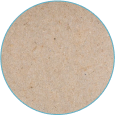
Recycled Kraft Paper
FSC Certified Recycled Kraft Paper is made from post-consumer content and printed with non-toxic inks. This paper is heavily customizable and can be tailored to your product specifications, design preferences, and functional requirements.
Thickness: 90-330gsm
Certifications: FSC (Forestry Sustainability Council) Certified 100% Recycled
Common Uses: Mailers, pouches
End of Life: Curbside recyclable with paper

Recycled White Kraft Paper
FSC Certified White Recycled Kraft Paper is made from post-consumer content and printed with non-toxic inks. This paper is heavily customizable and can be tailored to your product specifications, design preferences, and functional requirements.
Thickness: 90-330gsm
Certifications: FSC (Forestry Sustainability Council) Certified 100% Recycled
Common Uses: Mailers, pouches
End of Life: Curbside recyclable with paper
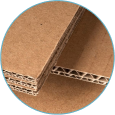
Recycled Kraft Corrugate
FSC Certified Recycled Kraft Board is made from post-consumer content and printed with non-toxic inks. This board is available in a variety of gauges, fluting styles, and design options to help you create shipping materials that meet your needs.
Thickness: Flutes can be fully customized
Certifications: FSC (Forestry Sustainability Council) Certified 100% Recycled
Common Uses: Shipping and mailer boxes
End of Life: Curbside recyclable with paper


Ocea™ Film
Our Ocea™ Film is made from FSC-Certified Virgin Paper sourced from 100% responsibly managed forests.
In most cases, recycled paper performs just as well as virgin paper. However, there are some applications where virgin content functions better. We determined that this was the case in our quest to create a plastic-free garment bag.
Our Ocea™ Film is translucent, silky-smooth, and water-resistant. This makes it ideal for garment packaging! Ocea™ Garment Film protects products while still allowing materials and barcodes to be visible without opening the inner packaging.
This film gives brands a plastic-free alternative to the conventional poly bag, which helps divert plastic from the landfill and keep pollution out of our environment. Since Ocea™ Film is curbside recyclable with paper, it supports circularity in packaging.
By bringing this film to market, we're working to pave the way for future paper-based garment films made with recycled content.
Learn more about how you can use Ocea™ Film in your garment packaging:

Ocea™ Garment Film
FSC Certified Virgin Paper Film sourced from responsibly managed forests. This film is translucent, water-resistant, and printed with non-toxic inks.
Thickness: 30-250gsm
Certifications: FSC (Forestry Sustainability Council) Certified Responsibly Sourced
Common Uses: Garment bags
End of Life: Curbside recyclable with paper


Compostable Plant-Based Films
Our compostable plant-based films are certified for home and industrial composting through trusted third-parties including ASTM and TÜV OK Compost Home.
We make our compostable films from a blend of cornstarch and PBAT, a bio-based polymer. Our materials are designed to break down quickly and return to the soil, contributing valuable nutrients without leaving behind toxic residues. Because of this, compostable packaging supports a closed-loop system, and diverts landfill waste, and helps reduce reliance on non-renewable resources.
When it comes to compostable packaging, our stance evolves over time as new results and research comes out. One thing is clear — we can’t keep relying solely on paper and LDPE (plastic) for the future of our packaging.
We recognize that our current options for compostable packaging aren’t “perfect” yet. Composting infrastructure is limited, testing standards are complex, and many bags still rely on petrochemical-based binders
However, if we don’t explore these options and expand the use of compostables, the industry will never progress toward better materials and infrastructure. For this reason, we view compostable technologies as an important investment into the future.
Our compostable films are highly customizable and tested to the highest standards. Explore plant-based packaging materials below!

EcoPackables D42 Film
Certified Compostable Semi-Opaque Film made from a unique blend of cornstarch and PBAT, a bio-based polymer. Both sides are sealable and printable, and colors can be customized. This film may be paired with D42 Bubble Film to create a cushioned mailer.
Thickness: 30-110μm
Certifications: EN 13432, ASTM D6400, AS 4736/AS 5810, TÜV OK Compost Home
Common Uses: Mailers, inner packaging
End of Life: Certified for both home and industrial composting

EcoPackables D41 Film
Certified Compostable Translucent Film made from a unique blend of cornstarch and PBAT, a bio-based polymer. Both sides are sealable and printable. Used as a single layer in laminates.
Thickness: 20-110μm
Certifications: EN 13432, ASTM D6400, AS 4736/AS 5810, TÜV OK Compost Home
Common Uses: Poly bags, inner packaging, laminate layers
End of Life: Certified for both home and industrial composting
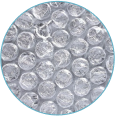
EcoPackables D42 Bubble
Certified Compostable Semi-Opaque Bubble Film made from a unique blend of cornstarch and PBAT, a bio-based polymer. This protective film is often paired with EcoPackables D42 Film or with a recycled Kraft paper exterior. Colors can be customized.
Thickness: Height and thickness are fully customizable
Certifications: EN 13432, ASTM D6400, AS 4736/AS 5810, TÜV OK Compost Home
Common Uses: Bubble mailers, cushioning, protective packaging
End of Life: Certified for both home and industrial composting


Food-Safe Laminates
Laminates and coatings have a reputation for decreasing the sustainability of packaging. We’re working to change that.
We’ve developed eco-friendlier laminates that are high-quality and food-safe grade. This allows you to create packaging like pouches and sachets that protect your products while still aligning with your brand’s values.
With options that are compostable, recyclable, or made with recycled content, we can help you match the laminate to your packaging for maximum sustainability.

EcoPackables C20 Compostable Laminate
Certified Home-Compostable laminate that is heat-sealable and food-safe grade.
Thickness: 80μm
Certifications: EN 13432, ASTM D6400, AS 4736/AS 5810, TÜV OK Compost Home
Common Uses: Paired with compostable films to create food-grade packaging for medium to high barrier needs
End of Life: Certified for both home and industrial composting
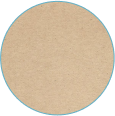
EcoPackables C21 Kraft Laminate
Recycled Kraft laminate with a surface-active paper outer layer that is suitable for printing. Kraft and white options available.
Thickness: Varies based on product needs
Certifications: GRS (Global Recycling Standard) 4.0 Certified Recycled Content
Common Uses: Paired with compostable laminate to create food-grade packaging for medium barrier applications
End of Life: Certified for industrial composting

EcoPackables C22 Compostable Laminate
Certified Home-Compostable Laminate with a metalized layer to provide a high water vapor and oxygen barrier.
Thickness: Varies based on product needs
Certifications: EN 13432, ASTM D6400, AS 4736/AS 5810, TÜV OK Compost Home
Common Uses: Paired with compostable films to create food-grade packaging for high barrier needs
End of Life: Certified for both home and industrial composting
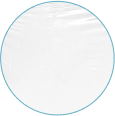
EcoPackables BioLaminate™
Innovative Carbon-Negative Laminate made from plant content. This laminate is an ideal alternative to conventional polyethylene and offers an elevated shelf life.
Thickness: Varies based on product needs
Common Uses: Paired with recycled plastic films to create food-grade packaging for [data needed] barrier applications
End of Life: Thin film recyclable
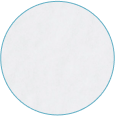
EcoPackables reLaminate™
Unique Post-Consumer Recycled Laminate that maintains a food-safe grade certification for pouches. This laminate offers an ideal alternative to virgin plastic laminates and extends products’ shelf life.
Thickness: Varies based on product needs
Certifications: GRS (Global Recycling Standard) 4.0 Certified Recycled Content
Common Uses: Paired with recycled plastic films to create food-grade packaging for [data needed] barrier needs that require an elevated shelf life
End of Life: Compatible with thin-film recycling for plastic packaging

Frequently Asked Questions
Before we even bring in a new material, we evaluate it to ensure it meets our rigorous sustainability standards. If we decide to stock a new material, we go through an extensive process of testing, prototyping, life cycle analysis, and certification. By the time a new material is available to the public, we’ve invested countless hours ensuring that it meets and exceeds expectations.
Trusted certifications are an important part of transparency. Many of our materials have one or more certifications. Our paper packaging is certified by the FSC for recycled content, our recycled films are GRS 4.0 certified recycled, and our compostable films are certified by ASTM and TÜV OK Compost Home.
Yes! Choosing recycled packaging helps promote greater packaging circularity, keeps usable materials out of the landfill, and strengthens recycling infrastructure. Almost all of our paper and plastic packaging options are fully recycled. We use either post-consumer or post-industrial waste, or a blend of both. In cases where virgin content is needed for functionality, we prioritize responsible sourcing.
We offer a suite of recycled, recyclable, and compostable laminates that are food-safe grade. This allows you to create packaging like pouches, sachets, and cartons that are suitable for direct food contact while still meeting your sustainability goals.
We provide end-of-life guidance for all of our materials. Generally, our plastic films are thin-film recyclable, our paper packaging is curbside recyclable, and our compostable packaging is home or industrially compostable.
We have gone to great lengths to make sure that our compostable films and laminates break down safely and effectively. They are certified for home and industrial composting. Unlike some biodegradable packaging, our films don’t leave any microplastics behind. Instead, they break down into water, organic biomass, and C02.
PBAT, or polybutylene adipate terephthalate, is a biodegradable, compostable plastic that is often used as a binder. It provides strength and flexibility while still allowing materials to break down in composting facilities. Certifying bodies such as BPI, TUV, ABA, and DINCERTO vet and approve materials that include PBAT for composting.
There’s no one right answer to this question! Each material has its own pros and cons — and what’s sustainable in one situation may not be the best choice in another. In many cases, the “most sustainable” option depends on the brand’s specific goals and needs. For example, brands looking to go 100% plastic-free will often choose recycled paper, while brands trying to reduce their carbon and transportation footprint may choose lightweight recycled plastic. This is why we work with brands one on one to determine which packaging is the best fit.
